Note
Dear Aunt Agony, you mentioned you have a cart system in your group for absent players. Could you explain how that works? Since the people in my group have started working it has become increasingly difficult to have all of them at the table for semi-regular sessions.
So basically as a reward for one their first missions you give the players a horse and cart. If a player is away for a session, the explanation for where their character is, is that they're "over on the cart". This means that if they really need to/want to interact with the character for whatever reason they're still technically there, but they're not totally present. As well it's an easy explanation for when the party is traveling.
What's ended up happening for me as well, is that my players have been working on upgrading the cart so it's more of a caravan for them. So if they're on the cart they can either work on that, tend to the horses, or work on some other kind of downtime activity. If your party is in the city they can also shop as well.
It also means that when they enter a new city, the character whose player is absent could be looking for lodgings, etc. because they're in charge of looking after the cart today.
It's a kind of simple solution but I find it easier for everyone to navigate/think about rather than trying to have the DM control the character, or trying think up different reasons why the character isn't there that session. I think it also means players feel less like they're totally missing out cause technically their character is there.
It's also, if you're going to introduce it, best to flag this in session 0/the first session - just so you set the expectations.
512 notes
·
View notes
Text
Making your setting more queer
Obviously, not everyone's gonna want this, but for those who do want to make their settings more queer, less cisheteronormative, I have some thoughts.
Fantasy and Sci Fi
The majority of games deal with settings where there are non-human sapient species that players can play. Since these creatures are explicitly not humans, and often exist in settings where there's some level of phlebotnium going around, there's really no reason to say they must reproduce or experience gender as humans do.
As an example- my take on kobolds has them as natural neuters who use alchemy to reproduce. Because they don't have sexes, their experience of gender is based on the draconic heritage a kobold expresses. My take on orcs makes them a mono-gender race, and all orcs are "orc gender," (something like Discworld dwarves) but also with a variety of additional genders based on how one contributes to their clan, and most orcs identify as both "orc gender" and the gender associated with their contribution to the clan.
Maybe your elves are particularly tied to nature/plants and so experience gender based on parts of nature or types of plants. Maybe your dwarves are particularly tied to the earth and minerals and so they have genders based on, like, stones or metals.
There's also no reason these creatures need to reproduce like humans do. As previously mentioned, my kobolds require an alchemical elixir to reproduce (tho that elixir allows them to sexually reproduce as [the majority of] normal earth animals do). Maybe the plant-elves reproduce through budding, or there's a special plant that they use to reproduce (in whatever way you want that to work depending on the seriousness/smuttiness of your game). Maybe the earth-dwarves are carved from stone in a ritual where two or more dwarves come together for that purpose. Maybe orcs have some kind of innate inhibition in mating, and blood allows them to overcome that. Or maybe orcs are less a true breeding species and more of a magical transformation that uses rituals to turn an existing being into an orc--if you want a setting where there are no baby orcs, this would be a way to do that.
While there are a lot of reasons that humans generally practice monogamous pairings, fictional species who do not have sexes or experience gender as real humans (broadly) do would have much less reason to mirror human relationship dynamics. My take on kobolds has authoritarian warrens that use mating ability as a reward and libertine warrens that hold orgiastic parties when the elixir is made, and neither has any reason to be monogamous. The former warrens probably discourage romantic relationships or, at best, ignore them so long as they don't hinder the effectiveness of the warren, while the latter probably tends more towards polyamoury and queer platonic relationships. If elves reproduce with a magic plant and rituals, there's no reason for them to have romantic relationships of any particular number of members, and ditto dwarves who reproduce by carving new dwarves from rock.
Humans
Whether in fantasy/sci-fi games or "technically the real world" games, humans already express a broad variety of gender experiences and relationship practices. The idea that "cisgender, heterosexual and monogamous is the norm" is relatively recent and fairly Euro/West-centric. While I don't have numbers saying that "not cis" or "not het" are in any way more common than cishet-ism, we certainly exist. And the further you get away from modern Western societies the less cisgenderness and heterosexuality are explicit things. A lot of ancient cultures just didn't think about sex/gender/orientation in the way we do, and a lot of them at least had a recognized place in society for people we would now consider trans/nonbinary/gay/asexual (that wasn't "punching bag" as modern society so often does....). A lot of cultures saw people who were what we now might consider transness or nonbinariness as a mark of divine nature.
Honestly, I would even go so far as saying a lot of cis people are really only cis because they've just accepted their categorization and never thought about how they identify or had a specific reason to identify as other than they were assigned, including people who broadly identify as they were assigned but might well be closer to demigendered. Given that gender is a socially constructed idea rather than something innate, this makes perfect sense, because no one is ever going to perfectly fit into these constructed ideas, and when they do, it's because of social pressures repressing and pruning away the things in a person that don't "fit."
18 notes
·
View notes
Text
Elf video games: 300 hour jrpgs with legions of characters and several novels worth of text. Labrynthine upgrade trees and customization options. The most insufferably unintuitive UI possible. A single turn based battle can take hours. Every character has an ennui stat.
Dwarf video games: Basebuilding strategy FPSs that has a whole wiki page on the flexile vs tensile strengths of different building materials. Dwarven rhythm games have minigames where you have to manage supply lines. Mortals cannot comprehend dwarven grand strategy games.
Halfling video games: What appears on the surface to be a viscerally calming farming sim is actually an extraordinarily complex social combat game about cutthroat HOA politics.
Goblin video games: Wildly unbalanced collectathon gatchas where half the fun is finding new hilariously broken strategies. Zany uberviolent team shooters about bugs. MOBAs so bad it's almost art.
Orc video games: Addictive in-browser flash games with names like "Beast Crush 4" and "Borag Meat Game." The art is always kinda bad but in a charming way. The music always slaps.
65K notes
·
View notes
Text
some random redemption arcs that aren’t just ‘zuko, but a little to the left’
I’m evil but all my evil friends betrayed me and I’ve decided that the best revenge is to ruin their evil plans. Yes, this means I’m a “good guy” or whatever. No, I don’t like it any more than you do.
I was evil but all my evil friends betrayed me and now I’m going to latch onto the first person who shows me kindness. If that happens to be the protagonist, I am totally fine with realigning my morality to match theirs.
I never wanted to do what I did, and now the biggest obstacle to me switching sides is convincing me that I’m not a living weapon.
Well as long as you’re imprisoning me in this magic amulet I might as well give you pointers on your technique. I mean come on if you all die I might be stuck here for millennia! It’s not because I like you and don’t want you to die. Nuh uh.
Look, I legit thought that being evil was going to be my best option to get this important thing done, but, uh, that didn’t pan out. Help?
45K notes
·
View notes
Note
i'm not super into dnd, mostly bc no real try at it has worked out w me and my family/friends and Current Events means i can't like go to my local game place, so i come with something that may not fit, but could be a good inspo for someone else. could you make a safe, happy place? like a lil sanctuary where adventurers can take a breather, maybe do some lil side quests for trinkets. no hidden motive, no secret evil, just a place to relax and grow together as a party. Maybe even some RP opportunities? idk, if that's too much then just pick out what u want to use. ty for ur time
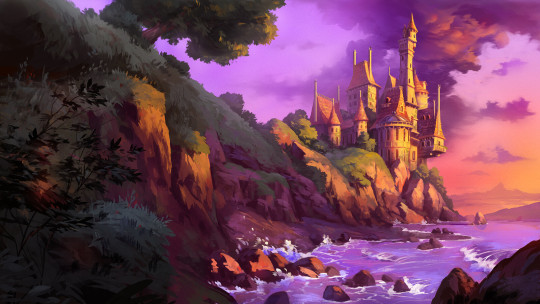
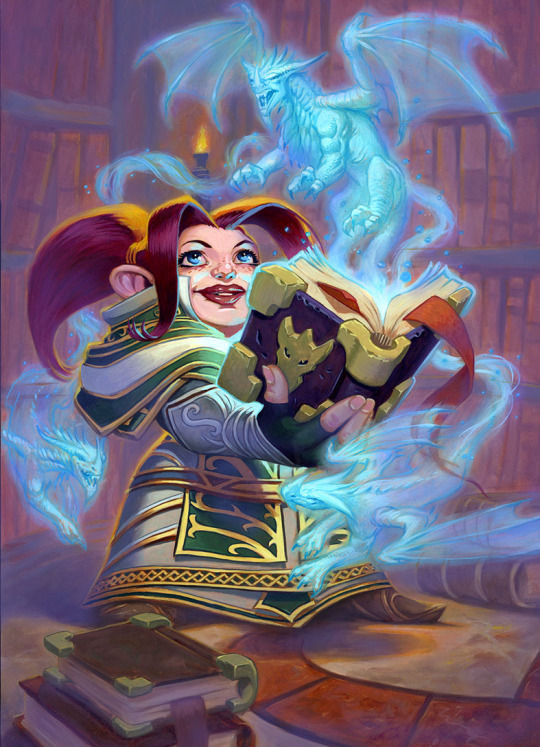
Player home: Duskwater Manor
Adventure Hooks:
Bruised, blooded, and exhausted after their last disastrous expedition, the party finds themselves on the doorstep of a grand lakeside estate, welcomed in by the few servants who maintain the grounds and provided a place to rest and refresh themselves. A true and lifesaving boon to be sure, but what exactly is this place, and why is it that the oft referred to mistress of the house never quite makes an appearance?
While in the company of some more seasoned adventurers, the party hears tell of a place called Duskwater Manor, a sort of clubhouse or retreat exclusive to those who've "made it" as wandering explorers and do-gooders. If the party wants to join this esteemed society, they'll need to bolster their reputation as local heroes, earning the respect of their peers and whatever unseen benefactor offers access to this manse.
Actually FINDING Duskwater Manor can be quite convoluted, as few in the nearby settlement actually recognize the name. Rather than instructions, the invitation the party may receive ( or stumble across in the course of their adventures) contains a few pleasantries and a hand drawn map depicting a stretch of the local lakeside. The heroes will need to put their cartographic skills to the test, searching out the area on foot or perhaps hiring a boat to survey the lake itself.
Setup: Built on the edge of a lake famous for the way it reflects and refracts the colors of the setting sun, Duskwater Manor is a scenic sanctuary located on the edge of civilized land, a perfect place of respite for those heading to/from adventurers in the greater wilderness.
While it was originally built as a small fortress meant to protect the town on the other side of the lake from raiders and river pirates, the structure was eventually abandoned and became a lair for wandering monsters. When a group of adventurers were hired to drive these monsters out, they fell in love with the beautiful lakeside views, and decided to refurbish the crumbling fortification as their base of operation. Generations later, Duskwater Manor is a haven for the wayward, providing a home for all those who venture far in service to the greater good.
Further Adventures:
Travelers and bravos congregate by the Manor's hearth, recuperating after long journeys abroad or simply preferring the scenery to the clutter of the nearby town. While some prefer to spend these days in solitude wandering the grounds, others cluster by the hearth or in the halls, trading boasts and stories of their travels. If the party keeps an ear out, these gossips can be an endless source of new adventure hooks, sharing tales of near and far and mysteries waiting to be explored.
Like any great house, Duskwater Manor employs people to take care of it, though the staff is largely limited to a few servants and groundskeepers, as well as a bargeman who ferries supplies and guests to and from town when offered the proper incentive. By far the most notable of this staff is the gnomish librarian Forebeth Valchi, the niece of one of the original adventurers who took Duskwater as their home. An ardent bibliophile and keeper of knowledge, Forebeth has a special interest in tales of dragons, and is delighted to speak with any who might share rumors or accounts of them. A party who befriends Forebeth can get leads on lost hordes, on wyrms still marauding out in the wilderness. They might even be able to bribe her with salvaged draconic scales or teeth for access to the Manor's restricted books and other secrets.
Though the servants speak of her with Reverance, and the guests toast to her each night, the Mistress of the Manor remains unnamed and unseen, making her will known through intermediaries or notes slipped under doors in the dead of night. Guessing at the Mistress's identity is a popular pastime among local adventures, with leading theories being a scandalized offshoot of the ruling family, a victim of a faerie curse of anonymity, or the ghost of one of the original adventures.
Art 1
Art 2
297 notes
·
View notes
Text
More inadvisable Dungeons & Dragons characters, grifters edition:
A fighter who makes a habit of escaping debts by faking their own heroic death, counting on their extraordinary resilience to let them sneakily walk away from fates that “everybody knows” they couldn’t possibly have survived. So far they’ve given their life 17 times; one town even put up a statue.
A wizard who’s perfectly capable of performing all the magical feats they claim to be able to do, but cheats people anyway using a combination of stage magic and simple pyrotechnics because they believe casting real magic spells in exchange for money diminishes the dignity of the craft.
A rogue who commits logistically improbable acts of thievery, then poses as a private investigator and offers to “solve” their own crimes. The evidence they gather convincingly points to some unpopular member of the town’s upper crust, whose protestations of innocence typically fall on deaf ears.
A cleric who claims to be a priest of a different god in every village they visit. It’s probably not a profit-making scam, since they don’t take payment or solicit donations unless doing so would be in character for whatever priesthood they’re impersonating this week, but they’re clearly up to something.
11K notes
·
View notes
Text
IF ANYBODY IS LOOKING FOR GOOD DUNGEONS AND DRAGONS PODCASTS/SHOWS HERE ARE THE ONES THAT I ENJOY:
- Critical Role (Vox Machina and The Mighty Nein): can be watched as a video/twitch stream (live!) or listened to as a podcast! Very classic fantasy, LONG episodes (2-4 hours every episode), they’re all voice actors so it really attaches you too their characters! I’m a simp for Matthew Mercer :), there’s 2 campaigns the first one is 115 episodes and the current second campaign is 120-ish episodes that’s still going!!! A ton of content!!! - Find on, YouTube, Spotify and Twitch!
- The Adventure Zone (Balance and Amnesty): can be listened to on YouTube or listened to as a podcast on Spotify! 3 brothers (who have their own advice show) and their dad! SUPER FUNNY. Easy to follow for first time players/listeners! Emotionally investing!!! I have wept over this podcast!!!!!! There’s a comic book series that’s a novelization of the podcast and it’s super well done! I have laughed so hard I feel like I’ve formed abs listening to this! I personally enjoy their first Campaign ‘Balance’ the best and their second campaign ‘Amnesty’ is my close second! They are on their 3rd campaign and there’s a TON of episodes for each!!! - find on, YouTube and Spotify!
-Dimension 20 (Fantasy High and A Crown of Candy) can be watched on YouTube or listened to as a podcast on Spotify! [I personally prefer to watch the videos because drawings of the characters come up on screen, (even for the side characters that we rarely see!)] Brennan Lee Mulligan is my favourite DM (dungeon master) he does amazing voices and is so great at immersing you in the world him and the other players have created! Fantasy High has a HUGE mystery element that genuinely had me guessing until the end, Brennan said that he wanted to make a game that “was if John Hughes made a Dungeons and Dragons game” and it works amazingly together!! I binged Fantasy High over the summer and the chemestry the cast and characters have is so good it feels like a little family :) A Crown of Candy I’ve just started watching and it’s awesome so far! The characters are so much fun it’s like DnD CandyLand! Also the sets for both campaigns are beautiful!!!! They do a great job of pulling you into and adding life into the world the cast has created!! - find on, YouTube and Spotify!
- Dungeons and Daddies: can be listened to as a podcast on Spotify! I just finished getting caught up on this podcast! It made me LITTERALLY laugh out loud multiple times, it’s about 4 dads who get sucked into a DnD world to rescue their sons, the DM plays all of the kids and all of the characters who aren’t the dads, THE PLOT TWISTS OH MY GOD, I have cried a LOT listening to this podcast, they do this thing at the beginning of each episode where they say a dad fact about their character and they’re always so funny and it’s a great way to start off the episode! Since it’s a podcast the editor adds music and super cool sound effects to really immerse you in their world! LOTS of references and really funny real world-esque jokes, had me hooked from episode one and is still keeping me entertained!!!!!! I love how much stuff the DM lets the players “get away with” when it comes to plans and combat it’s always funny to see what kind of Wile E. Coyote plans they come up with!! - find on, Spotify!
984 notes
·
View notes
Photo

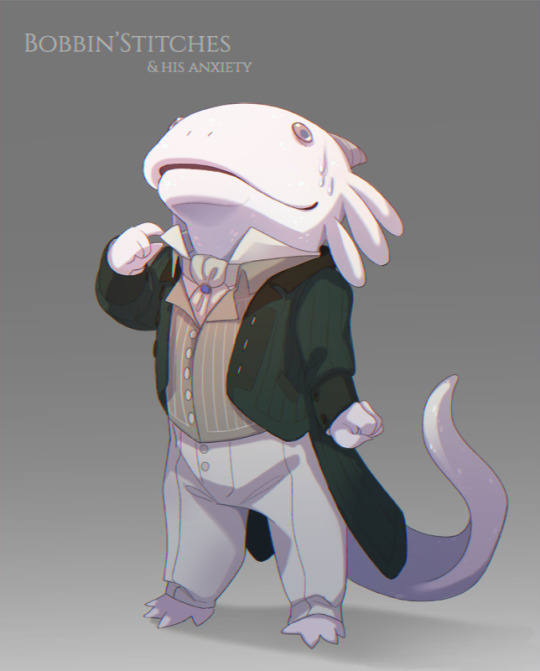

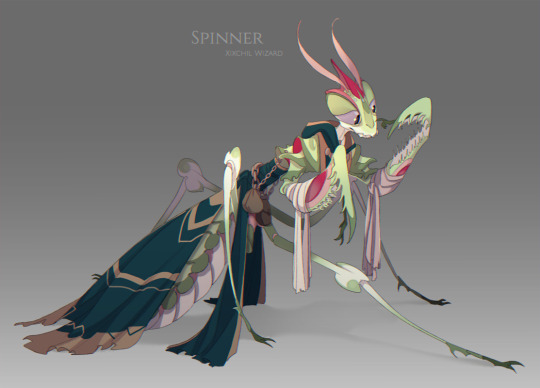

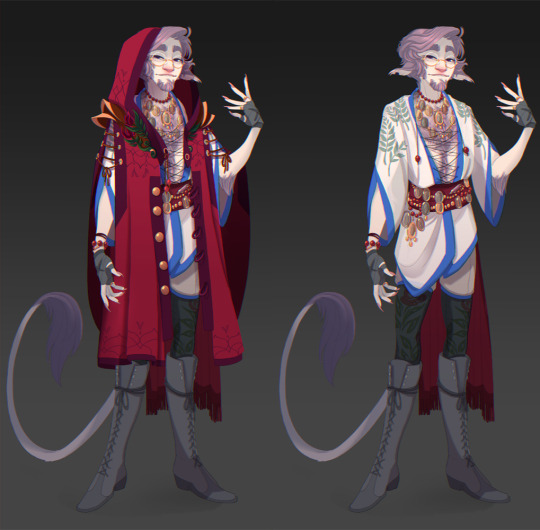

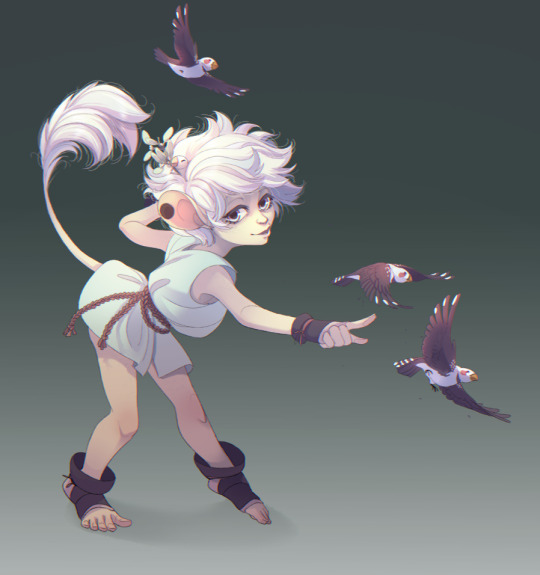
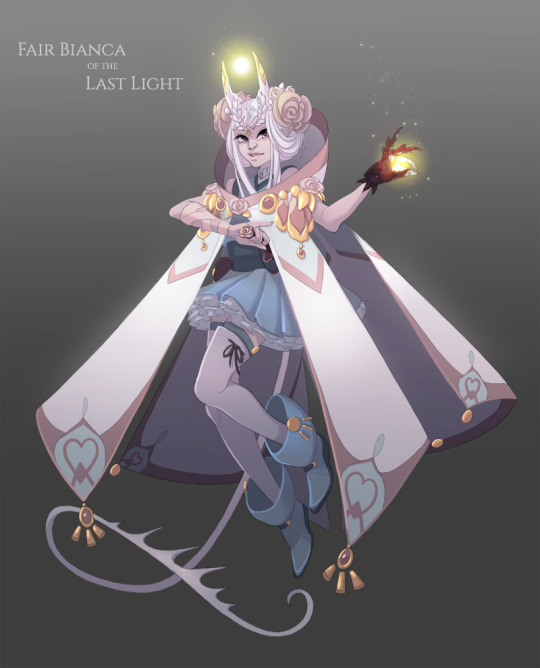

(posts an art to see how dead this place is)
2K notes
·
View notes
Text
Creating Deities and Pantheons
Creating Deities
Divine Portfolios
A deity has a certain realm that it lords over called a divine portfolio. A portfolio contains one or more species, places, things, or ideas that explain what the deity is all about. For instance, the Greek god Poseidon’s divine portfolio would include the seas, storms, waterborne travel, and horses.
Minor deities will only have one item in their portfolio, but major ones could have many. Further, a major deity that wished to delegate its power, perhaps to one of its children, could bestow one of the items in its portfolio onto another deity. Perhaps one deity goes to war with another in an attempt to seize an aspect of another deity’s portfolio for themselves.
New deities could even be created by filling a new role if a divine idea is not currently in any other deity’s portfolio.
Generally, the more power a deity has, the more broad the aspects in their portfolio will be. Likewise, lesser deities will have more specific aspects in their portfolio. For instance, a god of nature will be more powerful than a god of trees.
When creating your own pantheon of gods, try to divide up aspects into deities’ divine portfolios bearing all of this in mind.
Holy Symbol
A deity should have some sort of holy symbol that clerics can use for a spellcasting focus, but a symbol is more than that. A symbol lets mortals rally beneath it and recognize the deity’s followers. It a deity’s free advertisement to their people.
The symbol of a deity should reflect their portfolio in some way, as well as their alignment. It should be something unique that is easy to recognize, but also easy to replicate.
Favored Weapon
Many deities have some sort of weapon that they use and favor more than others. The deity will almost always use this weapon when manifested as an avatar. Wielding the same weapon as one’s deity shows an extra step of devotion to them, even if you aren’t a cleric to that god.
Random Portfolios
When creating your own deities, roll on the Random Portfolio Aspects table multiple times to find a random divine aspect to populate their portfolio. Some aspects defer you to another table to find a more specific aspect.
You can also use these tables as a jumping-off point to create your own portfolios and aspects, as there is no way to have a complete and exhaustive list.
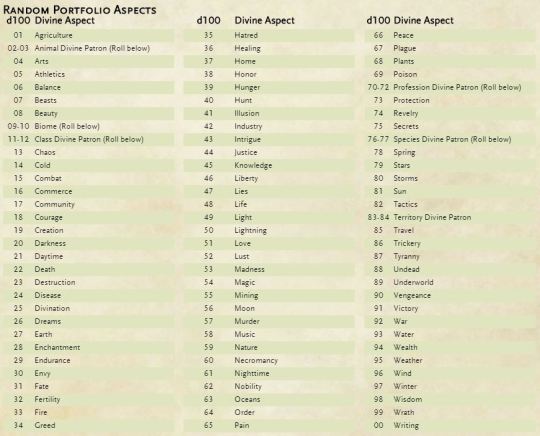



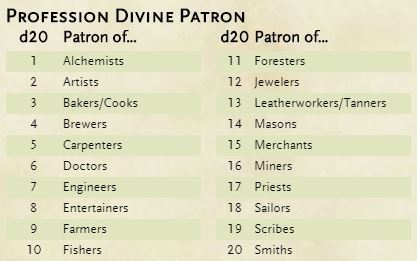

Pantheons
Pantheons are groups of deities. Your setting could have one or several pantheons. Perhaps you include pantheons from a variety of settings and incorporate them all in one place. Maybe different kingdoms or countries worship different pantheons, or just group the same deities in different ways. Our own world has many religions, each with their own god or sets of gods, so why can’t your setting?
While it is possible to have a monotheistic setting where only one deity exists, polytheism tends to be more interesting and supportive. Multiple deities allow for players to choose who their character believes in. If they are a divine caster, they can choose where their powers come from. This choice affects a player’s character and creates additional roleplaying opportunities as they confer with folks of the same or different religion.
Types of Pantheons
Some settings may have multiple pantheons. Here are some pantheons that can easily exist in the same setting.
Racial Pantheon. A race or species could have a whole group of gods to worship that are unique to them. For instance, the elves of your setting may worship their own set of deities. People might commonly refer to the “elf gods” or “dwarf gods” in such a circumstance.
Aspect Pantheon. A broad aspect or domain normally placed in divine portfolios may have its own pantheon. For instance, your setting may have a pantheon of death gods who take on aspects like death, undeath, afterlife, martyrdom, murder, plague, famine, and drought. All the minor aspects should be related to one greater aspect.
Regional Pantheon. In your setting, a certain region like a kingdom, country, or continent may worship different deities and have an entirely different pantheon that hold sway in their lands. Each region could have a pantheon all their own.
Religious Pantheon. Many religions exist in our own world, some of which have their own pantheons of deities. Different pantheons could have arisen in your setting from religions that developed separately. This works especially well if your deities are created through mortal belief.
Creating Pantheons
Myths. Deities in a pantheon often take on different responsibilities in running the universe, or at least take part in its history or its creation. Try to come up with myth surrounding each deity that explain why that deity exists. A deity should have some significance or importance within any pantheon you create, and your pantheon should cover a broad spectrum of created things.
Deific Relations. Deities should have complex relationships with one another to create a robust pantheon. Pick one or more from the Divine Relationships table when deciding how two deities relate, or roll randomly. Trying to justify how conflicting or unusual relationships occurred can create unique and interesting ideas. Is one deity’s son also their lover? Don’t be afraid to tread in the realm of mythological fantasy or dream-logic here.
Remember, existing myths are likely far stranger than anything you can come up with. A Norse cow licked a god out of primordial ice. In Greece, Athena was born of Zeus’s cracked skull after he tried to eat her. The Egyptian ferry to the afterlife has a mast that is the phallus of a fertility baboon-god. So you can get pretty unusual with your myths.

Pantheon Metagame. When designing a pantheon, you should also consider satisfying different elements that exist in the game. Each player could very well worship a different deity that supports their worldview in some way.
A good start is creating gods with various alignments, not just good and evil. With nine possible alignments, you can create some interesting deities. If you are making an entirely random deity, you can roll from the Deity Alignment table to determine the deity’s alignment.

Another game-related thing to consider is creating deities that will cater to existing character archetypes, such as mages, naturalists, outcasts, spiritualists, and warriors. Many pantheons have deities that would be worshiped by different classes. Try to provide deities that are tempting for each archetype to believe in, or ensure that some of your deities are more universal so many different classes would be interested in them. If you are creating a random deity, you can roll from the Archetype Patron table.
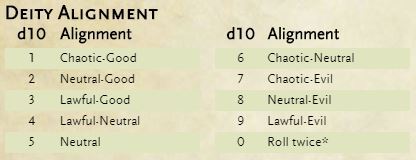
11K notes
·
View notes
Text
some dnd backstory ideas that give your character a reason to leave home that isn’t “everyone in my family died.” (just to say: i have nothing against those backstories (i use them a lot), but its fun to mix it up!)
family/friends/personal
someone close to you is sick. you need to adventure to find a cure
someone stole something important from you and you need to find it
you’ve received a message from a long lost relative and are trying to find them
someone that you love has been kidnapped (maybe you have to earn money to pay a ransom or complete some deed…)
adventuring runs in the family! everyone is expected to complete one quest in their lives
your family/culture sends people out to complete certain tasks when they reach a certain age as a rite of passage
another player’s character saved you in the past so you feel indebted to them and travel with them, protecting/aiding them
there’s a magical drought in your hometown and you have to fix it
your hometown doesn’t have a lot of jobs so you have to travel and send money back home
some childhood friends and you made a “scavenger hunt” where you try and complete a checklist of certain tasks (ie. defeat a barbarian in hand to hand combat, steal x amount of gold, slay a dragon, etc) in an allotted amount of time
quests/jobs
a god/patron has sent you on a quest to do something for them
you’ve been hired by someone to complete a task (and you get sucked into the big adventure along the way)
you’re on a quest for knowledge. maybe it’s to learn the best ways of fighting, maybe it’s something more academic related
your priest received a vision from your god and they sent you on a quest
you’re writing a book about the world and different cultures and you need first hand experience
you’ve found every map you’ve come across is shitty, so you decide to become a cartographer and make your own
you’re a detective who helps solve crimes and need to travel to solve a particular case
you’re a collector of a certain object and travel across the land to find it
you’re apart of an adventuring academy and have to complete a quest to graduate
you’re an artisan and you travel with your wares, trying to sell them. alternatively, you’re trying to spread word of your business and gain new business partners
you worked at a tavern your whole life where an old bard would sing songs of their adventuring party and that inspired you to go and do some adventuring of your own
feel free to add some of your own!
38K notes
·
View notes
Text
20+ Mechanics and Ideas To Spice Up Your D&D Combat!
Synchronised Button Pushes. Three obelisks stand far apart from each other, and need to be activated occasionally at the same time to prevent disaster (a sleeping monster waking, a magical explosion, etc). Each obelisk is guarded, either by a trap or a creature.
Hostage Situation. The enemies have hostages.
Floating Isles. A series of small floating islands all over, with the gravity changing direction each round.
Wild Magic Zone. There’s a Wild Magic Storm raging all around, causing every casting of a Spell to create a Wild Magic Surge!
Guerrilla Tactics. A boss that, instead of standing in a big room exchanging attacks with the party, fights dirty. Casting spells under Greater Invisibility, escaping to take the fight into a new, more favourable room, forcing the Party to chase them and guiding them into traps, etc.
The Floor is Lava. The combat arena is overflowing slowly with some dangerous substance, hindering party’s movement more and more with each turn.
Flaming Buildings! Enemies keep lighting everything on fire! The Party needs to keep putting out the fires or keep them contained while fighting the enemies.
Dockside Battle. The Party is fighting on a dock or boat, with underwater enemies trying to pull them beneath the waves!
Collapsing Dungeon! The entire area is collapsing, causing parts of the ground to fall away and debris to fall from above each round.
Avalanche! The battle takes place right in the middle of an avalanche!
Abyssal Portal. While the boss fight is going on, a powerful artifact needs to be destroyed or else a portal will open to the Abyss and Demons will pour out.
Dark Ritual. The Party must fight through the baddies, but also stop the ritual from completing.
Tall Grass. There’s very tall grass all around, giving everyone cover and giving enemies a new way to hide.
Sea Monster. Successfully steer a ship to safety that is being attacked by a sea monster.
Kill the Messenger. The enemy has sent a messenger to go get backup, and if it’s not taken care of quickly, a larger force will arrive and overwhelm the Party. If the messenger is killed quickly enough, then the bad guys could retreat, surrender, or release another messenger, depending on what you’re going for.
Silent Combat. The Party and the Big Bad are fighting in a situation where any sound would be equally detrimental to both sides. Maybe there’s a sleeping dragon nearby, or any concussive forces would set off an avalanche or a room collapse. Whatever it is, the fight must be conducted in relative silence or disastrous things could happen.
Tsunami of Death. A strange liquid (acid, lava, etc.) flows through the arena and expands each round, with new flows snaking across the battlefield as the battle goes on.
Dead Magic Zone. The battle takes place in area completely devoid of any magic, making casting spells both arcane and divine (including healing spells) impossible.
Magical and Mechanical Minefield. The Big Bad Boss is Invisible in an area filled with traps and magical glyphs. The Bad Guy won’t willingly step onto the traps or trigger the magical glyphs, but a Party of oblivious Adventurers however…
Possession. The Boss is a Ghost that possesses different friendly NPCs, turning them hostile until they’re knocked unconscious or killed outright.
Shipwreck! A fight underwater after a shipwreck, with other crew and passengers that need to be rescued before they drown.
Cliffside Combat. The Party are at the top of a cliff or fighting on an out-cropping on the face of a cliff. The enemies are attempting to scale it and the Party needs to continually kick them back down while not letting themselves be pulled off or falling to a grizzly death.
5K notes
·
View notes
Photo
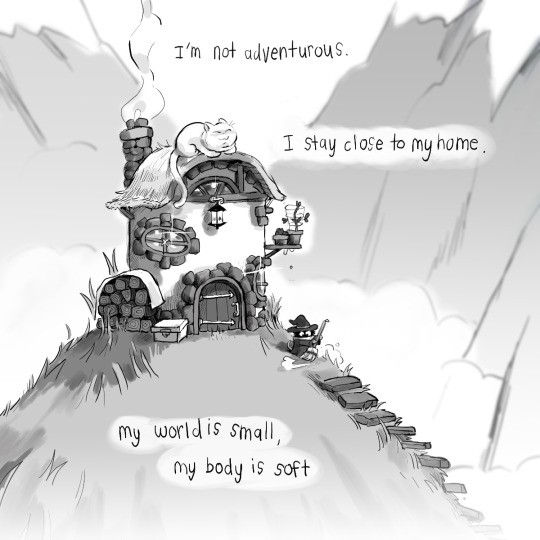
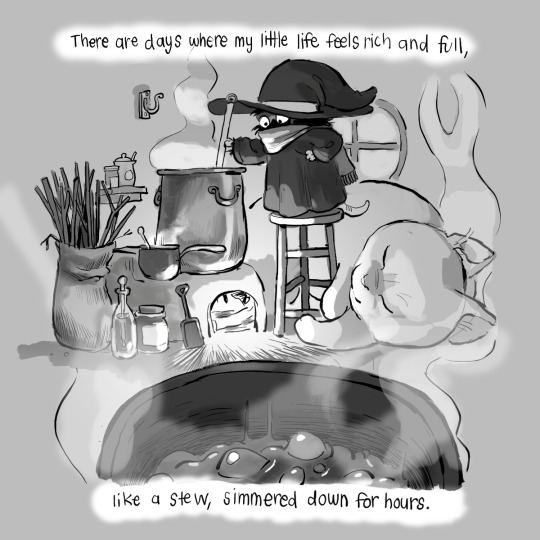

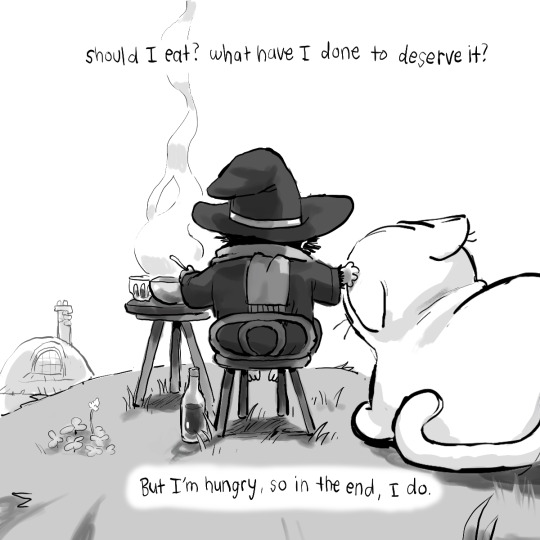
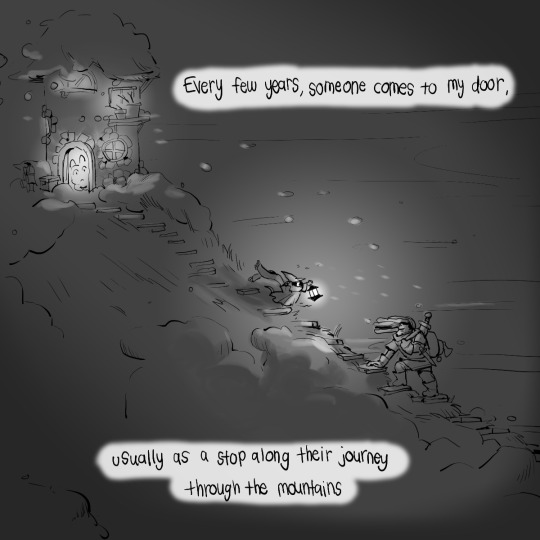
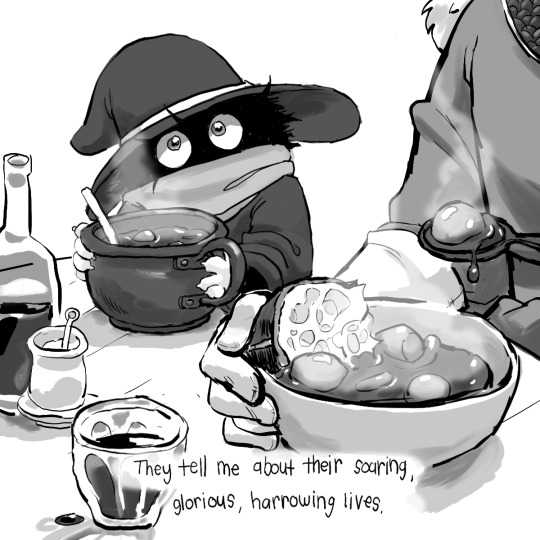
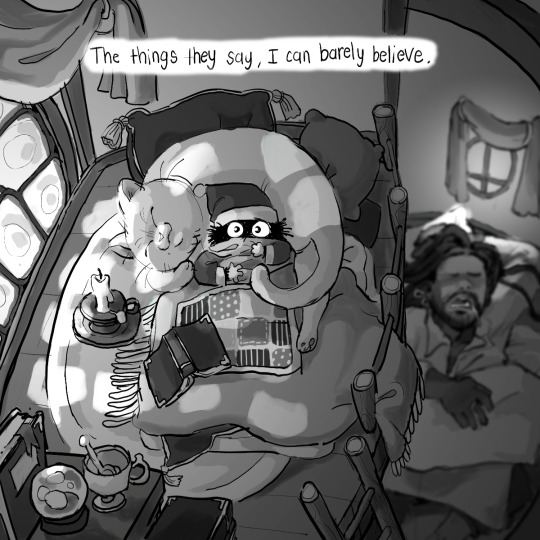
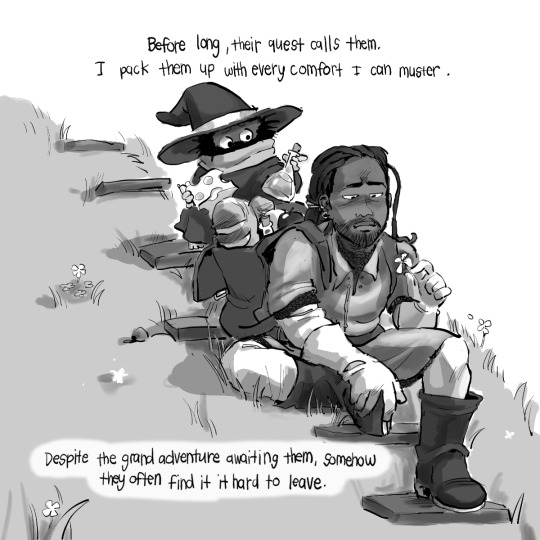
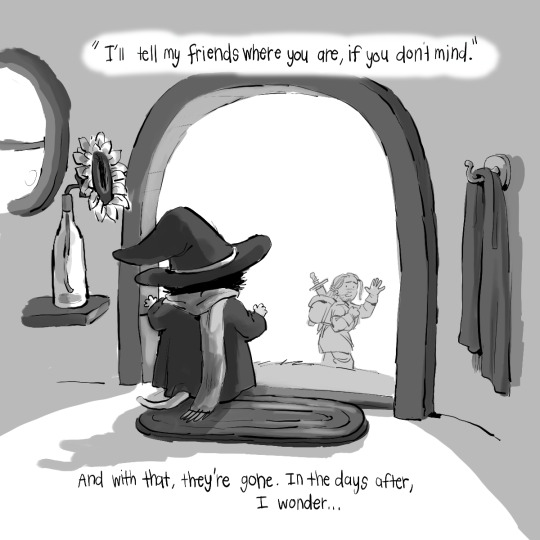
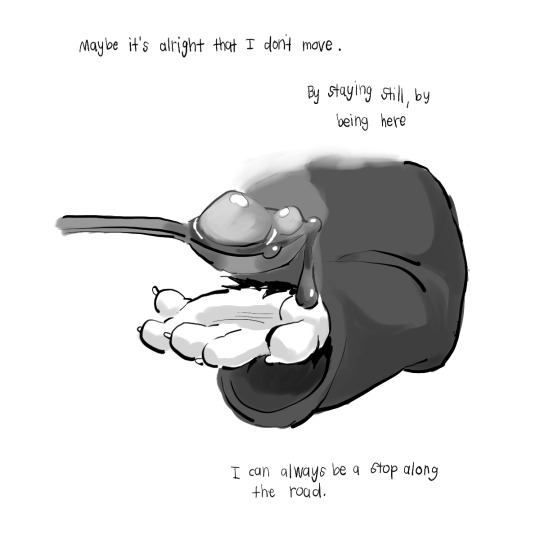
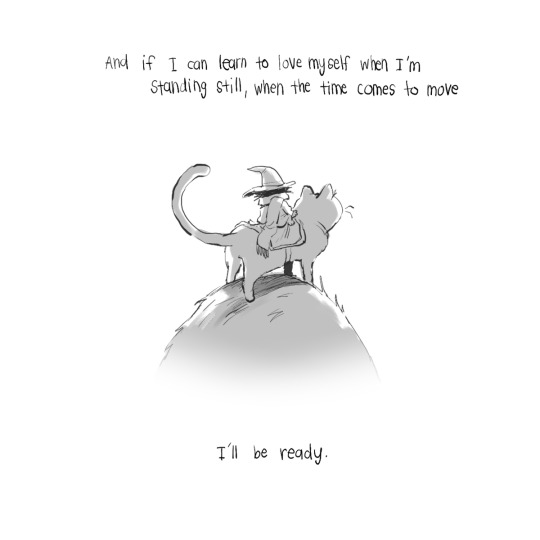
The Need to Stay
(Thought I’d upload my recent comics to Tumblr! I totally forgot it only lets you upload 10 pics at a time, and this is 11, but fingers crossed it works!)
135K notes
·
View notes
Photo
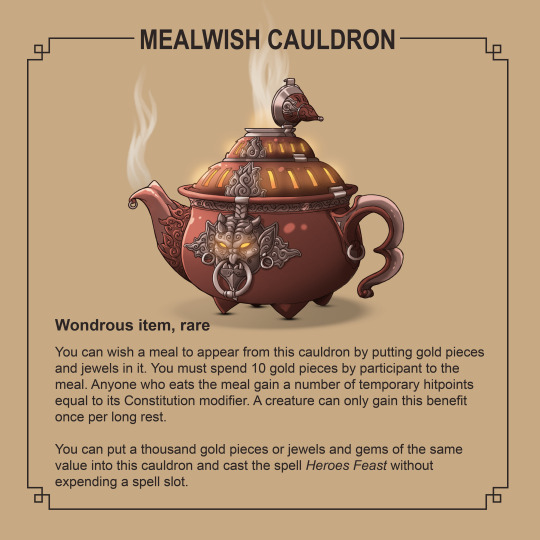

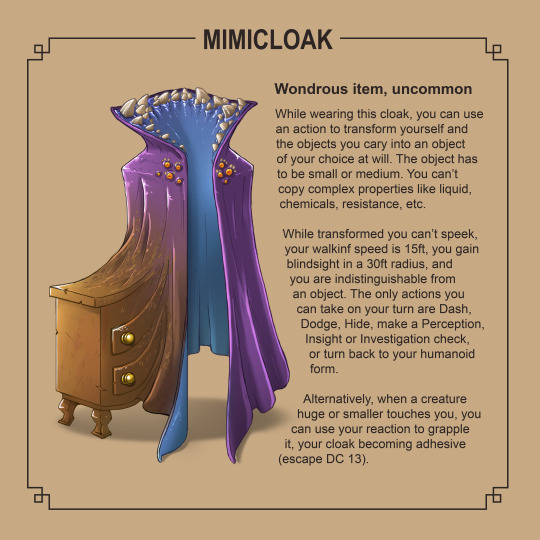
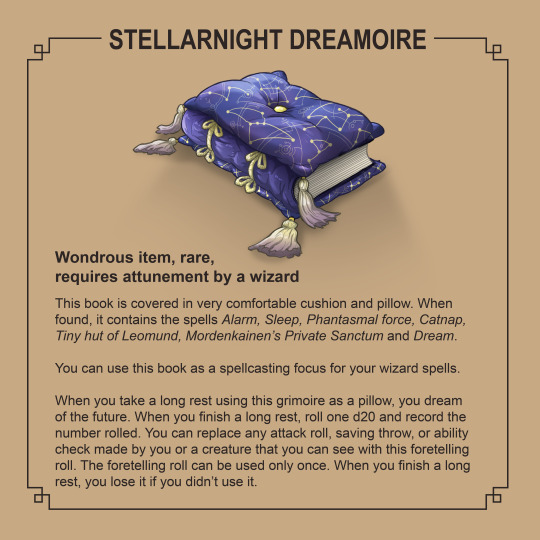

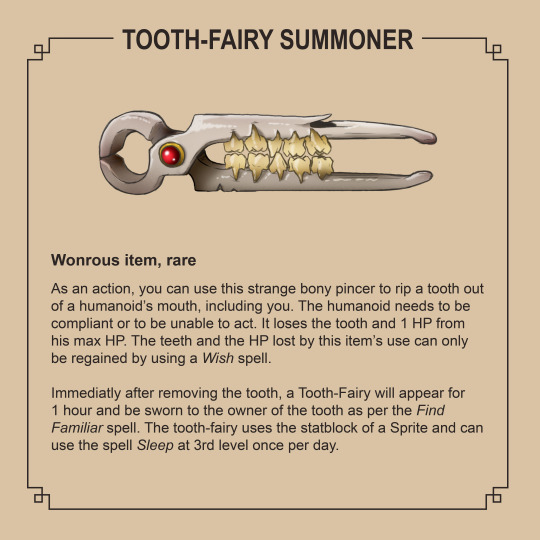
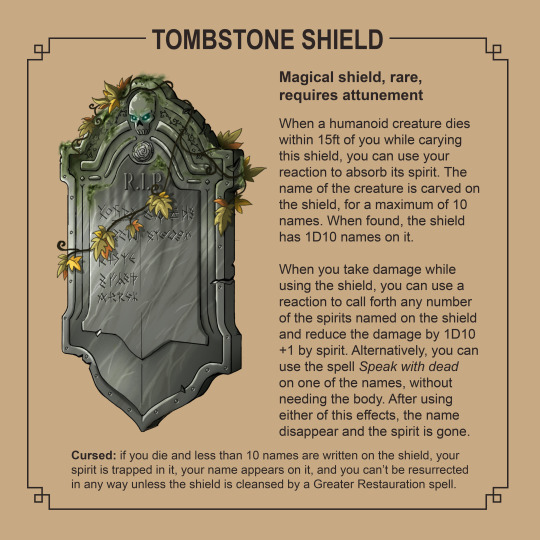
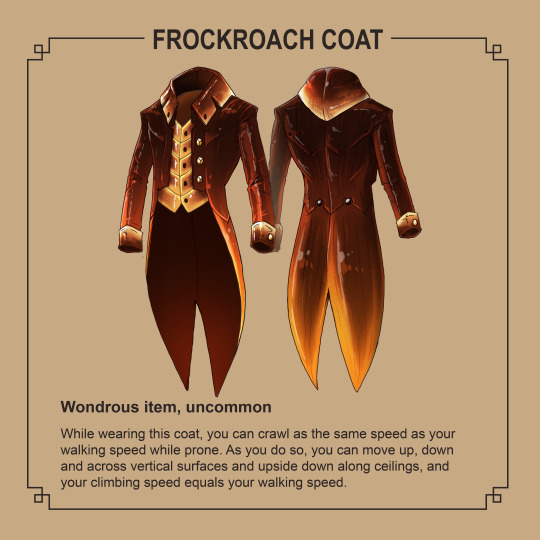
Just a lil recap of my favorite creations during the inktober challenge… WHICH I FINISHED FOR THE FIRST TIME.
I’ll go back to drawing monsters and characters too, but I am having a lot of fun making this magic items for DnD 5e. If you like them, it would help me greatly making it a viable project if I gain more followers on the dedicated instagram.
Anyway, tumblr is still my fav hell circle of the internet, I wanted to thank all of you, I love you all, my little cursed followers, and thank you all for the love, likes and reblogs <3
https://www.instagram.com/luca_emporium
20K notes
·
View notes
Text
My favorite form of redemption arc is “I hate that I have morals now”
187K notes
·
View notes
Photo
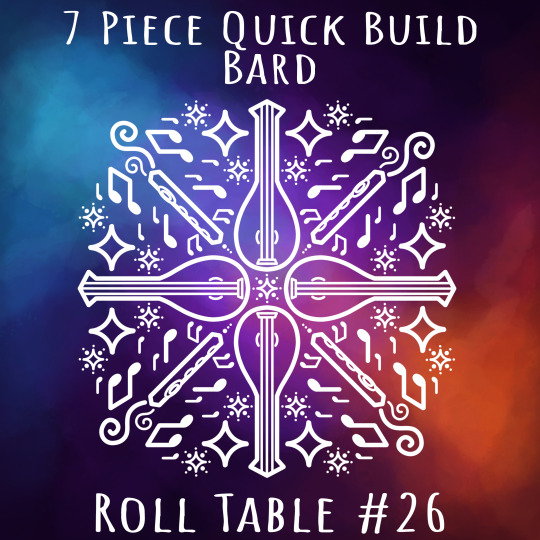


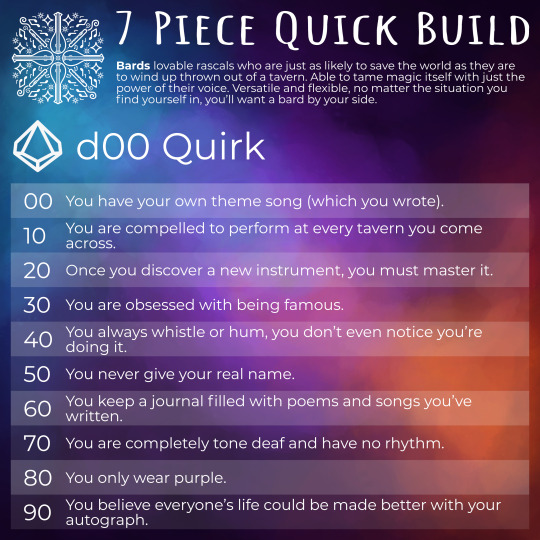


Bards lovable rascals who are just as likely to save the world as they are to wind up thrown out of a tavern. Able to tame magic itself with just the power of their voice. Versatile and flexible, no matter the situation you find yourself in, you’ll want a bard by your side.
If you want to help support us, head over to our Patreon: https://www.patreon.com/thescryingeye
555 notes
·
View notes
Photo
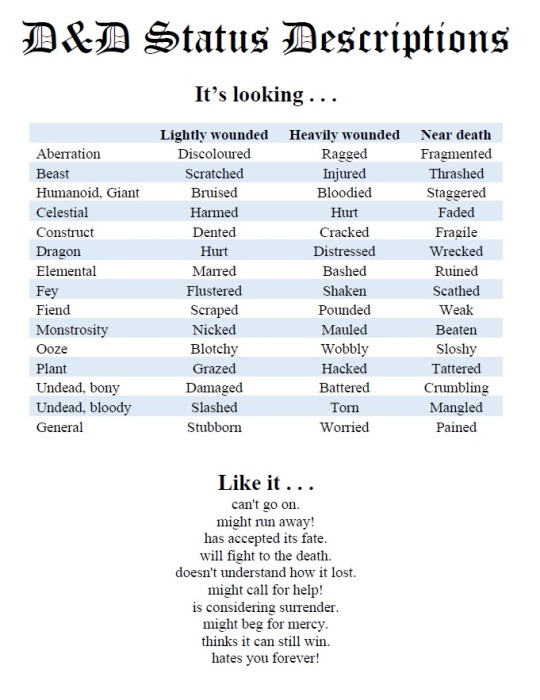
Status Descriptions for when my players ask how the monster looks
21K notes
·
View notes
Photo
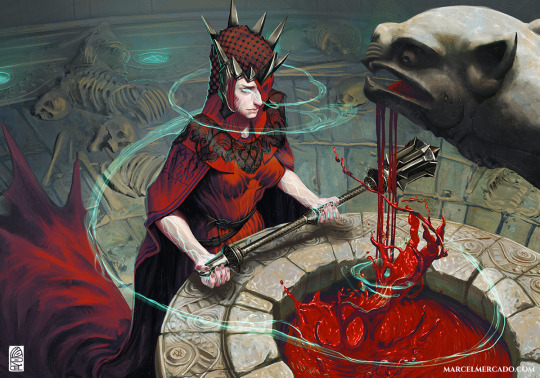
Villain: Sehria Heavensbane, the Hesitant Heretic
“!rhu-nyji, lord of toppled towers, hear my prayer as I stand before your altar on the eve of battle. I fear I do not measure against the task you and the elders have set for me. Though my arm is strong, mercy still rules my heart. How am I to topple the gods from their thrones if I am still ruled by such fragile mortality? Lift this weakness from my body that I might be a better instrument of your will.
Adventure Hooks
The forces of evil have begun to martial their ranks for war. Shrouded emissaries have appeared in the courts of wicked tyrants and bandit princess, the graves of old villains have been plundered for the making of undead war machines, and auspicious signs speak of demonic activity and the meddling of cruel gods. The guardians of the realm must marshal their defenses, expose their ancient enemy’s schemes before they come to fruit. Every millennia or so the heartless monsters of the world attempt to claim power and plunge us into a new dark age, and the scales of cosmic balance must be fiercely guarded
The Party Enters the city on the eve of a grand festival. Known as the vigil of fading hope, this quiet and solemn event is to mark a tragic night just under two decades ago, when without warning a crazed cut of red-robed figures appeared across the realm to steal away new born children. Though many of these fanatics were caught and killed, many of the children were never found, and the echo of loss and fear pervades the kingdom to this day.
While delving a ruin, tomb, or other sinister dungeon site, the party discovers that they have competition: a gaggle of red-robed cultists and monsters led by a timid young woman in an imposing Iron crown. Though her supporters seem raring for a fight, she entreats the party to act calmly. Surely there’s enough cursed relics and buried lore for all of them? Conflict and collaboration are both possible as the party must find a way to work alongside these fanatics, or else find an opportunity to ambush their rivals at a key moment.
Setup: Raised as the figurehead of a The Red Wellspring, a cult dedicated to an outer-god of chaos, this young Aasimar woman struggles with the duties placed upon her, a destiny of destruction and slaughter that has never quite fit her gentle temperament.
Sehria fretfully plays her role as would-be dark lord, miming the motions of petty tyranny and mouthing her way through the blasphemous sermons her peers and caretakers chant with sickhearted devotion. In truth she is a kind young woman who longs for the carefree innocence that was denied to her, forced from a young age to practice live sacrifice and forbidden magic the way that nobleborn children are forced to learn the piano.
Though her faith in evil may be a façade, her power is very real, wielding devastating magical abilities both taught and innate, and commanding a growing horde of horrors, fanatics, and plunderers that the Red Wellspring cult works to assemble for her day of glory.
It not long before her forces are ready to march against the gods, and should the party meet her in the field, they will find a foe no less formidable for her hesitancy. That said, if they can talk to Sehria, give credence to her doubts, show her that there is another option beside the lonely road to deicide, then they will have made a staunch ally against the forces of evil, and perhaps saved a young woman’s soul in the process.
Keep reading
620 notes
·
View notes